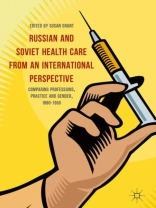This collection compares Russian and Soviet medical workers – physicians, psychiatrists and nurses, and examines them within an international framework that challenges traditional Western conceptions of professionalism and professionalization through exploring how these ideas developed amongst medical workers in Russia and the Soviet Union. Ideology and everyday life are examined through analyses of medical practice while gender is assessed through the experience of women medical professionals and patients. Cross national and entangled history is explored through the prism of health care, with medical professionals crossing borders for a number of reasons: to promote the principles and advancements of science and medicine internationally; to serve altruistic purposes and support international health care initiatives; and to escape persecution. Chapters in this volume highlight the diversity of experiences of health care, but also draw attention to the shared concerns and issues that make science and medicine the subject of international discussion.
Table of Content
Introduction.- Part 1: Professions and Practice.- Chapter 1. Difficult Sciences: The Emergance and Development of Medical Specialization in Russia, 1880s-1920s; Kim Friedlander.- Chapter 2. Creating Cadres of Soviet Nurses, 1936-1941; Susan Grant.- Chapter 3. Factory Medicine in Soviet Defense Industry during World War II; Donald Filtzer.- Chapter 4. A Soviet System of Professions: Psychiatry, Professional Jurisdiction, and the Soviet Academy of Medical Sciences, 1932-1951; Benjamin Zajicek.- Part 2: Gendered Health Care.- Chapter 5. Gender: A Useful Category of Analysis for the History of Nursing; Hafeeza Anchrum, Taryn Pochon, and Julie Fairman.- Chapter 6. ‘She has broken down the barrier of bigotry and exclusiveness and forced her way into the profession’: Irish Women in the Medical Profession, c.1880s-1920s; Laura Kelly.- Chapter 7 Gender and Russian Health Care, 1880-1905: Professionalism and Practice; Michelle Den Beste.- Part 3: Health Care Professionals Crossing Borders.- Chapter 8 Thinking Internationally, Acting Locally: Soviet Public Health as Cultural Diplomacy in the 1920s; Susan Gross Solomon.- Chapter 9 Public Health Nursing Education in the Interwar Periodl; Jaime Lapeyre.- Chapter 10. Refugee Nurses in Great Britain, 1933-1945: From Place of Safety to a New Homeland; Paul Weindling
About the author
Susan Grant is Lecturer in Modern European History at Liverpool John Moores University, UK. She is also the author of
Physical Culture and Sport in Soviet Society: Propaganda, Acculturation, and Transformation in the 1920s and 1930s (2012).












